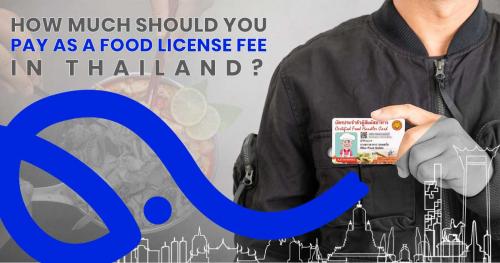What is the Cost to Get Food License in Thailand?

In addition to being a tourism hotspot, Thailand is also popular as a foodie’s paradise. Every year the kingdom witnesses a great footfall of tourists and business owners. Apart from these visitors, Thai citizens are also food fanatics and love to taste different cuisines of different ethnicities. These facts have inspired many business owners to start their food business in Thailand. If similar is your plan, along with the process, this article will also guide you on the food license fees in Thailand.
Basic Guidelines on Food License in Thailand
In Thailand, a food license, often referred to as a “food establishment license” or “food business license,” is a legal permit. It allows individuals or businesses to prepare, sell, or distribute food products to the public. This license is essential to ensure that food businesses meet certain hygiene and safety standards, protecting the health of consumers.
Types of Food Licenses
The specific type of food license you need can vary depending on the nature of your food business. Common categories include a restaurant license, street food vendor license, food production license, and more.
Regulatory Authority
The Food and Drug Administration (FDA) in Thailand is responsible for regulating food licenses and ensuring that food businesses comply with food safety regulations.
Application Process
To obtain a food license in Thailand, you typically need to submit an application to the local FDA office or the relevant authority in your area. The application process may require you to provide information about your business, food safety measures, and the location of your establishment.
After submitting your application, your food establishment will likely undergo inspections by health officials to ensure compliance with food safety standards. This may include checks on cleanliness, food storage, handling practices, and more.
Penalties for Non-Compliance
Operating a food business without the necessary license or violating food safety regulations can lead to penalties, fines, or even closure of the establishment.
Food Safety Standards
The Food Act B.E. 2522(1979) is the primary law governing all foods in Thailand. It gives the government and officials the power to regulate domestic food production, as well as the imports and exports of food goods for retail sale. It also specifies the requirements and penalties for food businesses in Thailand.
Food License Fees in Thailand
The government fees for food license depends primarily on the area of your business premises that you will use to cook and serve/sell food to customers. On the basis of the area of your business, the food license fee slab is as follows:
- Up to 10 square meters: 100 THB
- Additional 5 THB per square meter for more than 10 square meters
- Between 200 and 300 square meters: 2,000 THB
- Additional 5 THB per square meter for more than 300 square meters
However, the government fee is limited to 3,000 THB. This limit is likely a regulatory decision made by the Thai government to promote small and medium-sized businesses and to make it more affordable for them to obtain the necessary licenses to operate in the food industry.
So are you planning to start your restaurant in Thailand? If yes, then you must check whether you have the following documents.
Documents Necessary to Obtain Food License in Thailand
- The company’s affidavit (not older than six months)
- House registration of the building.
- Original consent letter or a copy of the lease agreement (affixed with a duty stamp)
- The copy of the ID card and house registration of the director of the company.
- The copy of the ID card and house registration of the owner of the business.
- Power of Attorney
- Signed and completed application form (SorAor1)
- Map of the location of the business (restaurant)
- Printed photos of the front and inside of the business (restaurant)
- Interior plan (layout) of the restaurant marking a sitting place, kitchen space, and other sections.
- Measurement of the whole restaurant in square meters including tables, kitchen, counter, etc.
- Documents to prove the ownership, such as the sale and purchase agreement, a title deed, or construction permit.
From the document requirement, you can understand that before getting your food license, you have to register your business in Thailand. Documents like the affidavit, power of attorney, and proof of business ownership mandate you to have a registered business in Thailand.
Be it registering your company or obtaining your food license in Thailand, feel free to email us at officer@konradlegal.com. We will start with a free email consultation and, henceforth, we will assist you throughout the process with our elegant services till you achieve success.
Post Your Ad Here
Comments